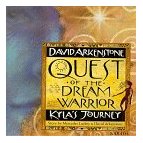David Arkenstone
Narada, 1995
Duration: 52:47

Remember the New Age music phenomenon that took over the radio waves back in the late 1980s? It has been a while since we heard anything from it, and my guess is that just like many other movements it will go into the dustbin of history with perhaps the exception of a couple of individuals. To be honest, it also hit me hard back in 1986 or so, when I was still a teenager franctically searching for a way to differentiate himself from the crowd. Pop music did not get to me anymore, in part because it had become too repetitive and in part because I myself made a conscious effort to avoid it, but it was certainly difficult as hell to find something new to replace it with. Heavy metal was not a choice because I had never liked it, classical had an obvious image problem for a teenage, and other styles such as flamenco, jazz, blues or country simply did not speak to me. Well, the New Age music came to fill in that void with some easy to listen tunes that nevertheless posed some challenges for a young man whose ears were made to the all pervasive pop (i.e. it was different enough that it required some effort on my behalf). Its positive sounding themes also helped, of course. The only problem is that, after a while, one grows up and notices that most of it is a repetition of the same ideas and, in that sense, no much different from pop music or rock at all. I understand "New Age music" was a very broad label that encompassed quite a few different personal styles, but of all the artists I listened to I think I can only save Andreas Vollenweider, Enya and some Yanni. Most other new age musicians come across as repetitive and perhaps too "uplifting" in the same annoying way the American self-improvement movement (you know, angels, yoga, kundalini and all that) is "radiant" in "positive vibes". It reaches the point where one does not know any more if it is music that matters or some sort of vague "spiritual revival".
So, what is Quest of the Dream Warrior? It is a fantasy tale written by Mercedes Lackey and centered around Kyla, a woman warrior, much in the style of many other pieces of fantasy literature that one can find on the bookshelves these days. As a matter of fact, the CD contains an insert with the story, which I personally did not find as enthralling as other people claim, but then I am no big fan of fantasy pieces which tend to put me off with their silly names that certain people try to pass as "creative" and "imaginative" (I simply cannot see how retelling the same story that many old legends and tales told us before but using names such as "Darnaak" or "Pavaan" is proof of any creative spirit whatsoever). David Arkenstone wrote the music to illustrate the story, with pieces that range from the medieval-like Dance of the Maidens to the more contemporary Road To The Sea or the enigmatic and nearly oriental The Temple of Vaal. The album opens with Prelude: Tallis the Messenger, a piece that includes some of the pyrotechnics we have come to expect from this type of music, together with some natural sounds and drums. It is a piece that, nevertheless, manages to express the excitement and exhilaration Kyla must have experienced when talking to Tallis, the Messenger, finishing all in a smooth transition to the rest of the adventure. Rythms Of Vision has more elements of rock and pop, but it is too repetitive, nearly cyclical. The Journey Begins: Kyla's Ride returns to the uplifting mood, adding some medieval-like tones to the tune thanks to the flutes and recorders. Once again though, it falls into an excessive repetition towards the end. The fourth theme, The Voice, falls back again in an inspirational mood with electric guitars in the background and "feel good" lyrics:
There are times in your lifeYes, it does sound like a lot of psychobabble right before slowing down into a more reflective theme like Dance of the Maidens where the flutes and recorders return, and we enter The Magic Forest with its mysterious background voices and melodic arrangements. Road to the Sea goes back to the joyfully inspirational world of the new age with references to "silver lights", "dreams in the sand", "rolling thunder in the distant lands" and experiences of touching the stars, while The Temple of Vaal offers a calmed break before Wings of the Shadow comes with its hectic and ecstatic tunes. Finally, Homecoming brings back the joy of the happy and dancing tunes, putting an end to an album that contains both the best and the wors of New Age music: the joy, the inspiration, the optimistic and uplifting tunes, together with the cliché, the common places, the repetition, the excessive use of synthesizers and electronic arrangements. As I said, most of the New Age music I ever heard of came across in the end as soulless. Sure, with a lot of pyrotechnics, optimistic, and even good enough for a soundtrack during a trip, but with little substance behind all the pretentious spirituality. Just as in the case of new age applied to any other field (psychology, religion, art, medicine...), all the joy in Quest of the Dream Warrior sounds somehow fake and shallow. Perhaps it is just me, and my eternal rational skepticism.
you must face a choice.
You will find what you need,
listen to the voice.
In the dark you can run
from the shadows of the night.
In the end you will find
you are standing in the light
Entertainment factor: 6/10
Artistic factor: 3/10